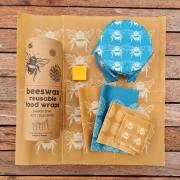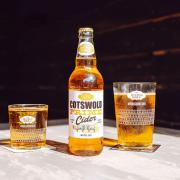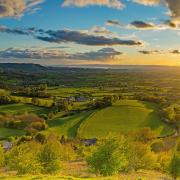With supermarkets increasing their share of the milk market where does that leave the independent dairy? Bullish, if you’re Cotteswold Dairy

Milk. One of Britain’s dietary staples for hundreds of years. And for many of them it appeared, as if by magic, on our doorsteps every morning. Full fat or gold top, none of the skimmed or semi-skimmed nonsense, and seldom from a supermarket.
But with today’s consumer mantras of choice, price and convenience, dairy producers are now obliged to produce dozens of variations on a milk theme. Semi skimmed this, skimmed that, pasturised, homogenized, organic and more, at the lowest cost. However, the dairy farmers who actually produce the milk have reportedly had a torrid time of it over the past year. Thanks to good weather conditions over the last 18 months producing good grazing, there is currently a significant oversupply of milk. Compound that with too many dairy farms (high milk prices in 2013 and early 2014 encouraged farmers to boost production), and more efficient milk production methods, some dairy farmers are having to sell their milk to the supermarkets for less than the cost of production, a situation that clearly can’t go on.
So how are the dairies themselves doing? Tewkesbury-based family business Cotteswold Dairy collects milk from 50 dairy farms across the Cotswolds daily. It processes and sells it to customers within a 180-mile radius. It doesn’t currently sell to supermarkets.
Managing director George Workman knows every one of his dairy farmers and tries to pay a premium for their milk, after all farmers need to make money. He’s also bullish about the industry and Cotteswold is currently in year one of a major expansion programme which he hopes will see production at the dairy’s six-acre site at Tewkesbury’s Newtown Trading Estate double from its current 90 million litres and £52 million turnover per annum. “Milk producers across the country are finding it tough in this supply and demand situation and we would love to pay more but we have to be competitive in our marketplace too,” he says.
The dairy has a wide market sector. George explains: “Doorstep deliveries represent around 10% of our business, our wholesale division delivers to shops, schools, other wholesalers, restaurants and garages, and we also do contract packing for the Rachel brand of milk.”
Working with a fresh product means it’s go all the time for the dairy’s 350 employees. This is no sepia-tinged leisurely, pastoral industry. The 21st century dairy business is fast paced.
Cotteswold Dairy was established by George’s grandfather in 1938 when he bought a milk round from his brother-in-law who wanted to return to dairy farming. At that time there were over 20 independent milkmen in Tewkesbury, but it was a relatively simple business, with housewives having just two choices of milk: full fat or gold top (from Jersey or Guernsey breeds of cows). Now the dairy handles around 70 different varieties and sizes of milk, from pasturised, homogenized, organic, Welsh, goats’, most of them offered as full fat, semi skimmed or skimmed, from 189ml to 1000 litres and it’s just launched a free range brand of milk too. It also sells cream, clotted cream, crème fraiche, soya and almond milks.
George is pragmatic about his product. “At the end of the day, apart from the soya and almond milks, it all comes from cows and we vary the fat and type of milk to meet our customers needs.” He drinks full fat or gold top.
His father came into the business in 1963 and George joined in 1991, after spending two years completing a food and dairy technology diploma and a further year working in other dairies to learn the business. There was never any discussion or pressure about joining the family firm; he didn’t want to do anything else, apart (he tells me later when I ask him what he would have done if he hadn’t wanted to work for Cotteswold) from having a private hankering to be a detective. DI Workman, foiling dastardly dairy derring-do? There could be a TV series in that.
When he finally joined Cotteswold, he was put to work learning the business from the bottom up, packing the product, operating all the machines and delivering the milk - even gaining a HGV licence.
“From a young kid I’d worked at the dairy in the holidays, folding cardboard trays to put cream-pots in at Christmas, so I was familiar with many of its systems and processes,” he says. A particularly horrible job was emptying the half-drunk 1/3 pint milk bottles returned from ungrateful school children. “They came back in crates with the tops still on and straws sticking out,” it clearly isn’t a very pleasant memory.
To set itself apart from the bigger milk producers, Cotteswold focuses on quality, service and core values. “If you can’t look after your customers, you haven’t got a business,” says George. ”We’re a Christian family and we also recognise that our employees are our best asset.”
Evidently the employees are happy too. Every year there are celebrations of staff completing 15 years or more of service. Some have been at Cotteswold over 30 years and one of its first employees completed a mammoth 52 years of service before retiring.
The Cotteswold brand makes up about 50% of the dairy’s sales, from local shops to as far afiend as Cambridge, Preston and London. It sells under the Dragon brand across Wales, supported by two depots in Wales, and another in Shrewsbury.
Until late last year there were three major dairies supplying the big supermarkets: Arla, Müller Wiseman and Dairy Crest. Last December, Dairy Crest sold to Müllers. Supermarkets generally like to have three suppliers and now they have two. Would Cotteswold consider supplying a supermarket behemoth? George is on the fence. “One of our core values is customer service and taking on a customer of this scale and the demands that go with it, you would need to ensure that you retained your focus on your existing customer base too.”
But plans go on apace at its Tewkesbury HQ, as Britain isn’t about to stop drinking milk. The business has planned a seven-phase development. Phase 0, which is currently under way, will create a new lorry park. This will be completed by June and will free up space to start phase one. Planning permission has been submitted for a new cold store, production facilities as well as welfare facilities for the staff. Phase 2 is additional cold store space. The next stages are dependent on the business’s speed of growth.
“This expansion means we will be able to increase our raw milk intake from farmers,” says George.
With milk and dairy consumption rising across the UK, (in 2014/15, UK milk production was 5.3% (714 million litres) higher than the previous milk year), Cotteswold is positioning itself to take advantage of a growing market.
Milk Facts
In June 2014, there were 13,815 dairy farms in UK, down 344 on 2013.
The number of cows in the UK increased by 3.3%in 2014 on 2013 with the largest increase in percentage terms was seen in Northern Ireland at 5.3%.
In 2013/14, the top quartile of producers managed to achieve a net margin of 7 pence per litre (ppl), contrasting with the bottom quartile making a loss of 4ppl, a range of 11ppl, when full economic costs are considered
The top quartile of dairy farms achieved 9% higher milk yield than the bottom quartile performers but, more importantly, had a total cost of production which was 27% lower on a ppl basis In 2014/15, UK milk production was 5.3% (714 million litres) higher than the previous milk year.
GB milk production rose by 5.3% in 2013/14 versus the previous milk year to its highest level since 2003/4.
The annual average consumption of liquid milk fell by 13.7% between 2003 and 2013. A significant reduction in whole milk purchases offset an increase in semi-skimmed milk.
Cream and butter consumption has increased by over 20% between 2003 and 2013.
The total liquid milk market in GB grew 3.5% to almost 5.5 billion litres in the year ending March 2015.
* Source, Daily Statistics: An insider’s guide 2015. Agriculture and Horticulture Development Board Stoneleigh Park Warwickshire CV8 2TL
A frothy story
A growing market for Cotteswold Dairy is coffee shops and chains such as JD Weatherspoons. One of the things important to this food and drink retailer is frothy milk, and it requires its suppliers to guarantee their milk will froth.
Apparently milk doesn’t always froth because of a cow’s diet. “In spring and autumn a herd’s diet will change as farmers move them from being inside and eating winter grass silage to outside, where they can munch on fresh grass,” says George. For a few days the change of diet can affect the milk, making it more difficult to froth. Which is why Cotteswold has invested in a frother



























